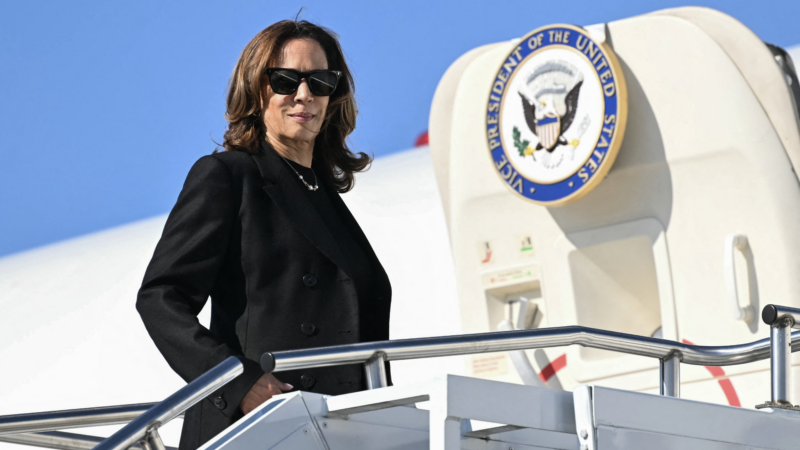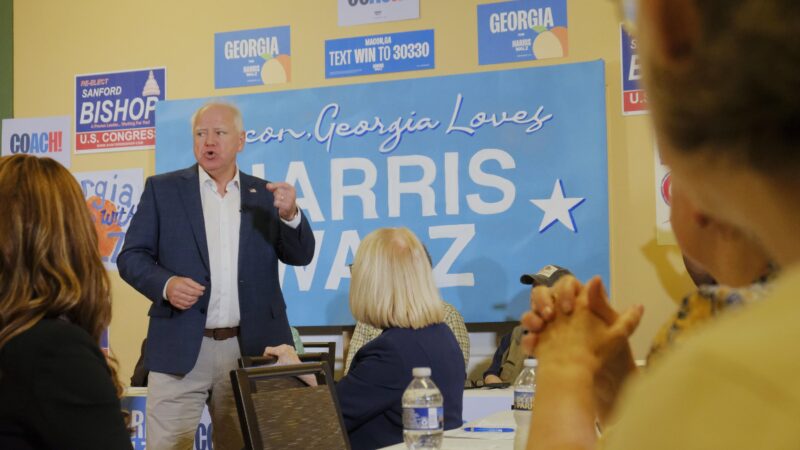If Harris wins, she would make history. But she isn’t talking about that
If Vice President Harris wins in November, she would make history as the first female president and the first woman of color to hold the highest office in the land. But Harris’ campaign isn’t leaning into this, and Harris herself studiously avoids getting dragged into conversations about her identity.
She had only been running for president for a little more than a week when her opponent, former President Donald Trump said Harris “happened to turn Black” during an interview at the National Association of Black Journalists conference.
Trump was asked to explain his comments during Tuesday night’s ABC News presidential debate, and he doubled down, saying he had read that “she was not Black” and that “I read that she was Black.”
Harris, whose mother was Indian and whose father is from Jamaica, was asked to respond, and she chose not to focus on herself.
“I mean honestly, I think it’s a tragedy that we have someone who wants to be president who has consistently, over the course of his career, attempted to use race to divide the American people,” Harris said.
It was vintage Harris.
Although she often talks about her parents, it’s usually in the context of the values they taught her or to underscore her middle-class upbringing.

The ‘first’ question seems to irritate Harris
Since she first ran for office, Harris has never centered her campaigns on her race or gender, even as she has repeatedly made history in 20 years of public life. She often seems annoyed when asked about it.
In Harris’ recent CNN interview, anchor Dana Bash asked Harris about the viral photo of her grand-niece watching her accept the Democratic nomination last month.
The little girl, her hair in braids, is in the foreground of the photo, watching Harris on stage speaking. For many, this photo spoke to the idea of Harris as someone who would be a first. But when Bash asked Harris what it means to her, the vice president sidestepped the question.
“Listen, I am running because I believe that I am the best person to do this job at this moment for all Americans, regardless of race and gender,” Harris said.
In a 2017 interview on the Axe Files podcast, Harris mocked reporters who, when she was San Francisco District Attorney and California Attorney General, would ask her what it’s like to be the first woman in the job.
“And I would tell them, ‘I really don’t know how to answer that question because you see, I’ve always been a woman, but I’m sure a man could do the job just as well’,” Harris said.
Harris wants to focus on issues, not her identity, allies say
Harris allies see Trump’s attacks as bait that would draw Harris into a conversation on his terms rather than hers, and that could turn off swing voters she needs to reach.
“Trump is trying to use it as a playbook, to talk about identity politics instead of issues, to make it about her instead of the people,” said Karen Finney, who worked on Hillary Clinton’s campaign and has known Harris for a long time.
Finney said it’s smart for Harris to avoid the fray, especially now.
Finney, who like Harris is biracial, said the Vice President’s identity is on display whenever she walks into a room. But what voters want to hear about is what she’s going to do to improve their lives.
“I know this from my own life, people say, ‘What are you?’ and it’s like, can’t I just be me then let’s just talk about what we’re here to talk about?” said Finney. “And I think for her there is a feeling of let’s just focus on the work.”

Clinton’s campaign used her gender to motivate Democrats
Hillary Clinton took a different approach eight years ago, when she was the Democratic nominee. She talked about the women whose shoulders she stood on and the cracks she and her supporters were making in what she called “the highest, hardest glass ceiling.”
But she also spent a lot of time reacting to Trump and his record of sexist insults.
“Whenever I talk about affordable childcare, and paid family leave and equal pay, he says I’m playing the women’s card,” Clinton would say at her rallies. “And you know what I say? If that’s the case, then deal me in.”
The line always generated big applause.
Christina Reynolds worked on Clinton’s campaign and is now at the group Emily’s List, which works to get women elected. She says back then, there were questions about whether America was ready to elect a woman.
The campaign decided to lean into Clinton’s potential to make history, to motivate the Democratic base. That’s not so necessary now, Reynolds said.
“The more women that run, the more we see this at a higher level, the more we know that America has elected to women at all these different positions — the more we can say, ‘Stop centering us in our identity solely and allow us to actually talk about what we’re going to do for America,’” Reynolds said.
With less than two months left in this campaign, Reynolds says Harris doesn’t have any time to waste. She needs to spend every moment focused on issues voters care about.

Delegates wore white. Harris did not
In 2008, Hillary Clinton often wore white to mark milestone moments in her campaign in honor of the suffragist movement that fought to get women the right to vote in the early 20th century. She accepted the nomination in a white suit.
On the last night of the Democratic convention in Chicago last month, the arena was a sea of white. The delegates had coordinated to dress in white, as a nod to the history that Harris could make. But Harris herself wore a conservative navy blue suit and never once mentioned making history in her speech.
To Debbie Walsh, who heads the Center For American Women and Politics at Rutgers University, this approach has echoes of former President Barack Obama’s 2008 campaign. With the exception of one memorable speech, Obama didn’t make his racial identity part of his campaign pitch. He was running to be president, not the first Black president.
“He did not talk about the fact that, ‘If I’m elected president, I will be the first Black president of the United States.’ We all knew it,” Walsh said.
“He was disrupting the image of who can be president of the United States and he did that successfully,” Walsh said, noting that like Obama, Harris doesn’t have to talk about being a woman of color for everyone to know she would make history if she wins.
NPR’s Megan Lim contributed to this story.
Transcript:
ARI SHAPIRO, HOST:
If Vice President Harris wins in November, she would make history as the first female president and the first woman of color to hold the highest office in the land. That’s not something Harris and her campaign are emphasizing, which is a distinct shift from 2016, when Hillary Clinton was the Democratic nominee. NPR senior White House correspondent Tamara Keith covered both campaigns. She has more.
TAMARA KEITH, HOST:
Harris had only been running for president for a little more than a week when former President Donald Trump weighed in on her racial identity, saying she had turned Black. During Tuesday night’s ABC News presidential debate, he was asked to explain his comments.
(SOUNDBITE OF ARCHIVED RECORDING)
DONALD TRUMP: All I can say is I read where she was not Black that she put out. And I’ll say that. And then I read that she was Black.
KEITH: When she was asked to respond, Harris chose not to focus on herself.
(SOUNDBITE OF ARCHIVED RECORDING)
VICE PRESIDENT KAMALA HARRIS: I mean, honestly, I think it’s a tragedy that we have someone who wants to be president who has consistently, over the course of his career, attempted to use race to divide the American people.
KEITH: It was vintage Harris. Although she often talks about her mother, who was from India, and her father, who grew up in Jamaica, it’s usually in the context of the values they taught her. She’s never centered her campaigns on her race or gender, even as she’s repeatedly made history in 20 years of public life. Here she was in 2017 on “The Axe Files” podcast.
(SOUNDBITE OF PODCAST, “THE AXE FILES”)
HARRIS: In particular, when I was DA and AG, reporters would come up to me and ask me this really original question, put a microphone in front of my face. So what’s it like to be the first woman – fill in the blank – DA/AG? I’d look at them, not knowing how to answer that question, and I would tell them, I really don’t know how to answer that question because, you see, I’ve always been a woman (laughter). But I’m sure a man could do the job just as well.
KEITH: Harris studiously avoids getting dragged into conversations about her identity. Karen Finney, who worked on Hillary Clinton’s campaign and has known Harris for a long time, says it’s smart, especially now.
KAREN FINNEY: Trump is trying to use it as a playbook to talk about identity politics instead of issues, to make it about her instead about the people.
KEITH: Finney, who, like Harris, is biracial, says the vice president’s identity is on display whenever she walks into a room. But what voters want to hear about is what she’s going to do to improve their lives.
FINNEY: And I know this from my own life. It’s that – you know, when people say, well, what are you? And it’s like, well, can I just be me? And then let’s just talk about what we’re here to talk about, right? And I think there’s a feeling for her of, let’s just focus on the work.
KEITH: This is a different approach from Hillary Clinton eight years ago, when she was the Democratic nominee. She talked about the cracks she and her supporters were making in that highest, hardest glass ceiling. But she also spent a lot of time reacting to Trump and his record of sexist insults.
(SOUNDBITE OF ARCHIVED RECORDING)
HILLARY CLINTON: And whenever I talk about affordable child care and paid family leave and equal pay, he says I’m playing the woman’s card. And you know what I say? If that’s the case, then deal me in.
KEITH: Christina Reynolds worked on Clinton’s campaign and is now at the group EMILY’s List, which works to get women elected. She says, back then, there were questions about whether America was ready to elect a woman. The campaign decided to lean into Clinton’s potential to make history to motivate the democratic base. That’s not so necessary now.
CHRISTINA REYNOLDS: The more women that run, the more we see this at a higher level, the more we can say, stop centering us in our identity solely, and allow us to actually talk about what we’re going to do for America.
KEITH: With less than two months left in this campaign, Reynolds says Harris doesn’t have any time to waste. She needs to spend every moment focused on issues voters care about. Tamara Keith, NPR News.
GPB morning headlines for September 18, 2024
Vice presidential candidate Tim Walz kicked off a Harris campaign swing through two battleground states—Georgia and North Carolina---in Macon Tuesday. The two candidates for Chatham County district attorney took to the stage this week in Savannah for a voters' forum. Musical artists paid tribute to former President Jimmy Carter Tuesday in celebration of his upcoming birthday.
U.S. sues Dali ship owner and operator for $100 million over Baltimore bridge collapse
“The ship’s owner and manager … sent an ill-prepared crew on an abjectly unseaworthy vessel to navigate the United States’ waterways,” the Justice Department says in its new civil claim.
A bookstore too controversial for China finds home in D.C.
This Shanghai bookstore, now in D.C., was revived by its owner, who hopes to create a space for open discussions in the diaspora community, where people can sit and read together.
Tupperware, no longer a kitchen staple, files for bankruptcy
Tupperware's reliance on people selling its storage containers at home-and-garden parties or through social media was once its strength. Now it's a weakness, the company says in its bankruptcy filing.
‘Brothers and Ghosts’ is a multi-generational saga of the Vietnamese diaspora
Khuê Phạm's debut novel follows a young Berlin journalist whose parents emigrated from South Vietnam. A message from an estranged uncle in the U.S. prompts her to explore her family history.
What today’s interest rate cut means for you. And, a big drop in U.S. overdose deaths
The first interest rate cut since 2020 is expected to be announced today by the Federal Reserve. And, for the first time in decades, U.S. drug overdose deaths appear to be plummeting.





